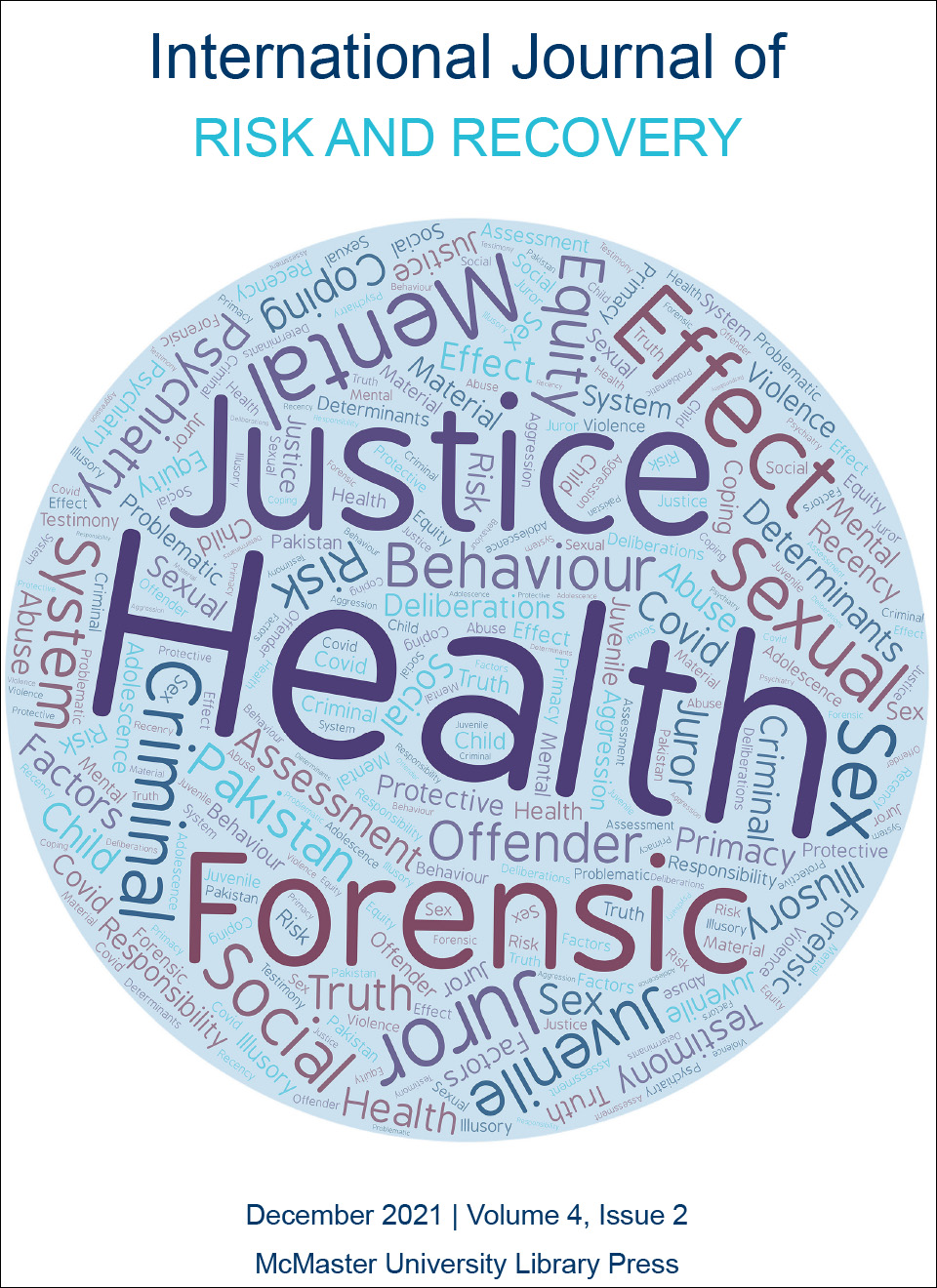Forensic Psychiatry in Pakistan: An Update
DOI:
https://doi.org/10.15173/ijrr.v4i2.4622Keywords:
forensic psychiatry, mentally ill offender, criminal justice system, criminal responsibility, juvenile justice system, PakistanAbstract
Pakistan is a lower-middle income country in South Asia where forensic psychiatry is often not recognized as a distinct subspecialty of psychiatry. Although evolution toward this direction has begun, more development in this field is needed. Before Pakistan’s Mental Health Ordinance of 2001, much of the mental health legislation and intitutional infrastructure pertaining to the mentally ill offender can be traced back to the Indian Lunacy Act of 1912. The past two decades have witnessed important legal developments in the role of psychiatry in Pakistan’s criminal justice system. This has been seen through the devolution of health-care provision and by an extension of psychiatric service provision from the federation (federal government) to the four provinces. Despite the sparse resources allocated to psychiatry, competent yet scarce psychiatry residents are graduating from Pakistan’s accredited residency programs with an interest in forensic psychiatry. The objective of this article is to reflect on the past, while examining the current state of existing forensic mental health in Pakistan. This article will also address the future trajectory of forensic psychiatry in Pakistan and supports the establishment of forensic psychiatry as a subspecialty in Pakistan.
References
Hussain F. The Judicial System of Pakistan. Islamabad: Federal Judicial Academy; 2015. https://www.supremecourt.gov.pk/downloads_judgements/all_downloads/Judicial_System_of_Pakistan/thejudicialsystemofPakistan.pdf.
College of Physicians and Surgeons Pakistan. Karachi: CPSP, n.d. https://www.cpsp.edu.pk.
Government of Pakistan. Mental Health Ordinance. Islamabad: Government of Pakistan Printing Press; 2001. http://punjablaws.gov.pk/laws/430a.html.
Tareen A, Tareen K. Mental health law in Pakistan. British Journal of Psychiatry International. 2016;13(3):67-69.
Sindh Mental Health Act, 2013. http://www.pas.gov.pk/index.php/acts/details/en/31/237.
The Sindh Mental Health Rules. Karachi: Government of Sindh; 2014. http://sindhlaws.gov.pk/setup/publications_SindhCode/PUB-15-000271.pdf.
Pakistan Penal Code, Act XLV of 1860 (Updated on 06 May 2018). http://nasirlawsite.com/laws/ppc.htm.
UNCRC Committee’s General Comment No. 24 (2019) on Children’s Rights in the Child Justice System [adopted on September 18, 2019]. https://tbinternet.ohchr.org/Treaties/CRC/Shared%20Documents/1_Global/CRC_C_GC_24_8968_E.docx.
The Pakistan Code. The Code of Criminal Procedures, 1898. http://pakistancode.gov.pk/english/UY2FqaJw1-apaUY2Fqa-apea-sg-jjjjjjjjjjjjj.
Qanun-e-Shahadat Order, 1984. https://punjabpolice.gov.pk/system/files/qanun-e-shahadat-order-1984.pdf.
Juvenile Justice System Act, 2018. http://www.na.gov.pk/uploads/documents/1519296948_886.pdf.
Government of Pakistan. Police Order, 2002 (chief executive’s order no. 22 of 2002). http://npb.gov.pk/wp-content/uploads/2014/08/police_order_2002.pdf.
Group Development Pakistan, American Bar Association. Representing child victims: training manual for legal aid lawyers.
https://gdpakistan.org/wp-content/uploads/2021/04/Training-Manual-for-Legal-and-Lawyers.pdf.
Federal Ministry of Law and Justice, Terre des hommes Foundation, BackerMcKenzie, the office of the UNSRSG on VAC, Penal Reform International, International Association of Youth & Family Judges and Magistrates, et al. National Preparatory Consultation on Justice with Children (2021). https://gdpakistan.org/wp-content/uploads/2021/02/World-Congress-on-Justice-with-Children-Meeting-Notes-Jan_2021.pdf.
The Prisoners’ Act, 1900. http://punjablaws.gov.pk/laws/17.html.
Hassan T, Nizami AT, Hirji S. Forensic psychiatry in Pakistan. International Journal of Law and Psychiatry. 2015;41:95-104. https://www.sciencedirect.com/science/article/abs/pii/S016025271500076X?via%3Dihub.
Bilal F, Saeed K. Psychiatric morbidity among the female inmates of District Jail Adyala, Rawalpindi. Rawal Medical Journal. 2011;36(2):129-132. https://www.ejmanager.com/mnstemps/27/27-1297006596.pdf?t=1570003627.
Cursor of Development and Education Pakistan, National Counter Terrorism Agency Pakistan, International Committee of the Red Cross. Addressing overcrowding in prisons by reducing pre-conviction detention in Pakistan. 2018. http://codepak.org/wp-content/uploads/2018/05/Addressing-overcrowding-in-prisons-by-reducing-pre-conviction-detention-in-Pakistan.pdf.
Supreme Court of Pakistan. In the Supreme Court of Pakistan (Review Jurisdiction) 2021. https://www.supremecourt.gov.pk/downloads_judgements/c.r.p._420_2016.pdf.
Downloads
Published
How to Cite
Issue
Section
License
Copyright (c) 2021 Tariq Hassan

This work is licensed under a Creative Commons Attribution 3.0 Unported License.
Copyright Notice
Authors who publish with this journal agree to the following terms:
- Authors retain copyright of their work and grant the International Journal of Risk and Recovery the right of first publication with the work simultaneously licensed under a Creative Commons Attribution License. This allows others to share the work with an acknowledgement of the work’s authorship and initial publication in this journal.
- Authors are able to enter into separate, additional contractual arrangements for the non-exclusive distribution of the journal’s published version of the work (e.g., post it to an institutional repository or publish it in a book) with an acknowledgement of its initial publication in this journal.
- Authors are permitted and encouraged to post their work online (e.g., in institutional repositories or on their websites) before and during the submission process as it can lead to productive exchanges, as well as earlier and greater citation of published work. (See The Effect of Open Access.)

